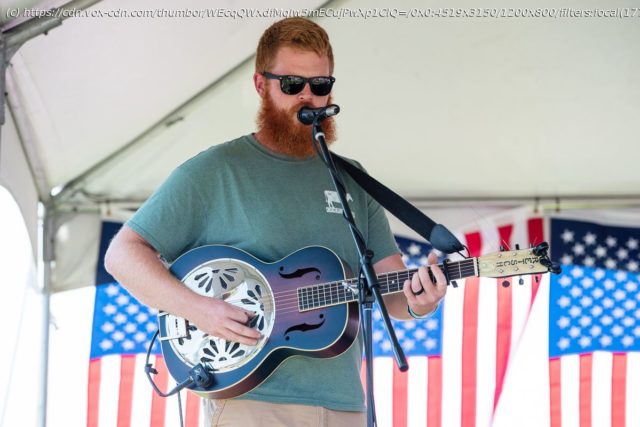Right-wing Billboard breakout Oliver Anthony and the conservative country boom, explained.
If you’ve paid any attention lately to mainstream radio, Billboard rankings, or viral internet hits — or if you watched the first Republican debate — you may have noticed that country music has been getting all the attention. In particular, a string of country crossovers has been burning up the charts — each one building on the last in the same culture war controversy.
Wallen’s Hot 100 streak was briefly interrupted by Jason Aldean’s viral success for “Try That in a Small Town,” a song replete with thinly veiled references to lynching outsiders. Released in May, the song didn’t make a huge splash until the controversial music video — shot at the site of a historical lynching — dropped in mid-July. The backlash over the video prompted a conservative counter-backlash, which propelled Aldean’s song up the charts — although no sooner had the song hit No. 1 than it tumbled a full 20 spots back down. It’s currently hovering just outside the top 20 on the Hot 100.
Hard on the heels of Aldean and Wallen, complete unknown Oliver Anthony went viral in August for his oppressed common-man anthem “Rich Men North of Richmond,” after a YouTube user released a video of Anthony performing the song live. Despite lyrics that reference QAnon themes and mock people on welfare with what many have read as racist stereotypes, the song is so popular that Anthony now has 18 songs currently ranking in the Apple Music Top 100. On August 22, he became the first artist in Billboard history to debut at No. 1 on the Billboard Hot 100 without any prior chart history. His song was so popular as an expression of conservative rancor, in fact, that at the beginning of Wednesday night’s GOP debate, Fox News moderators used the song to frame their opening questions to candidates.
Fox anchor Martha MacCallum described the song as expressing « alienation » and « deep frustration with the state of government and of this country, » an observation which prompted Florida Gov. Ron DeSantis to speak of the need to reverse « American decline. »
At a distance, Anthony is a truly mythical success story — until you consider the context of that success. Indeed, the throughline of these recent country hits is not their musical style. Wallen is arguably closer, aesthetically, to a twangy Post Malone than to Anthony, who performs traditional folk, with Aldean somewhere in the middle.
Rather, these artists all arguably charted at least in part because they — purposely or not — tapped the vein of conservative resentment that has fueled numerous other consumerist movements this year. From the backlash against Target and Budweiser over their queer and trans-friendly marketing, to the viral push to promote the anti-human trafficking film Sound of Freedom and its QAnon-adjacent rhetoric, each of these campaigns has arisen out of conservative disgruntlement with the mainstream, a feeling of being ostracized and marginalized. The motivation to “fight back” against the evils of liberal morality increasingly involves wielding individual purchasing power as a way to make a collective statement. Boycotting and promotion have worked in equal measure throughout 2023 for conservatives; both have yielded results.
Now, that consumerist mentality has found new subjects: Wallen, Aldean, and Anthony — with other, more unapologetically far-right artists, waiting in the wings. Morgan Wallen isn’t quite like the others — but context matters
Without the larger context of the era we’re in, Morgan Wallen might not fit into this pattern. After all, one of the traits of his music, especially in the newest album, is a kind of strategic ambivalence about his own dirtbaggery. His songs are replete with the catchy themes country lyrics are well-known for: wordplay, whiskey, and pickup trucks, with wry flourishes of bitterness and self-defeat.
Through songs like “Last Night” and “Money On Me” — key lyric: “I wouldn’t put my money on me” — his lyrical stand-in comes across as a slightly guilt-ridden white guy, a man who vaguely understands that he’s gained an uncomfortable level of status and privilege but not someone who has the insight to do more than sardonically reference his past missteps. It’s the kind of post-ironic take on modern masculinity we’re more used to seeing in pop stars like Post Malone or even The Wknd. His music goes well with a diet of pop or country, and his reputation as a nice guy made it go down easy.
“I have no trouble imagining he said it like he’s familiar with it, like his mouth has been there before,” Abdelmahmoud wrote. “This is an artist who has traded on his authenticity since he first came on the scene … Wallen has positioned himself as a mullet-and-blue-jeans, what-you-see-is-what-you-get kind of guy. And it’s impossible to watch the video without this in mind.






